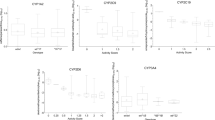Summary
The relationships among the metabolic ratios for the standard probe drugs of CYP2D6 activity, such as debrisoquine, sparteine, metoprolol and dextromethorphan, were studied in 32 Turkish subjects. All subjects were randomly selected according to their phenotypes from a group of 111 Turkish subjects whose oxidation status had been tested for debrisoquine previously. All subjects were given a 10 mg debrisoquine tablet, a 100 mg sparteine tablet, a 100 mg metoprolol tablet and a 20 mg dextromethorphan capsule orally with a wash-out period of at least 1 week between each probe administration. Metabolic ratios were calculated as percentage of dose excreted as parent drug/percentage of dose excreted as its hydroxymetabolite of parent drug in 0–8 h urine. Three poor metabolisers (PM) of debrisoquine were identified. They were also PMs of the other test probes and no misclassification by the 4 phenotyping methods was observed. All six correlations among the metabolic ratios of the 4 probe drugs assessed by Spearman’s rank test were highly significant (P<0.001). The present findings indicate that the oxidative metabolism of debrisoquine, sparteine, metoprolol and dextromethorphan is catalysed by the same cytochrome P450 in the Turkish subjects.
Similar content being viewed by others
References
Eichelbaum M., Gross A.S. (1990): The genetic polymorphism of debrisoquine sparteine metabolism — clinical aspects. Pharmacol. Ther., 46, 377–394.
Horai Y., Ishizaki T., Taga J., Ishikawa K. (1990): Correlation among the metabolic ratios of three test probes (metoprolol, debrisoquine and sparteine) for genetically determined oxidation polymorphism in a Japanese population. Br. J. Clin. Pharmacol., 29, 111–115.
Bozkurt A., Basci N.E., Isimer A., Sayal A., Kayaalp S.O. (1994): Polymorphic debrisoquine metabolism in a Turkish population. Clin. Pharmacol. Ther., 55, 399–401.
Eichelbaum M., Bertilsson L., Sawe J., Zekorn C. (1982): Polymorphic oxidation as sparteine and debrisoquine: related pharmacogenetic entities. Clin. Pharmacol. Ther., 31, 184–186.
McGourthy J.C., Silas J.H., Lennard M.S., Tucker G.T., Woods H.F. (1985): Metoprolol metabolism and debrisoquine oxidation polymorphism-population and family studies. Br. J. Clin. Pharmacol., 20, 555–566.
Basci N.E., Bozkurt A., Isimer A., Kayaalp S.O. (1994): Correlation between the metabolic ratios of debrisoquine and metoprolol in Turkish subjects. Pharmacol. Toxicol., 75, 62–64.
Basci N.E., Brøsen K., Bozkurt A., Isimer A., Sayal A., Kayaalp S.O. (1994): S-mephenytoin, sparteine and debrisoquine oxidation: genetic polymorphisms in a Turkish population. Br. J. Clin. Pharmacol., 38, 463–465.
Woolhouse W.W., Eichelbaum M., Oates N., Idle J.R., Smith R.L. (1985): Dissociation of coregulatory control of debrisoquine/phenformin and sparteine oxidation in Ghanaians. Clin. Pharmacol. Ther., 37, 512–521.
Sommers D.K., Moncrieff J., Avenant J. (1989): Metoprolol alpha-hydroxylation polymorphism in the San Bushmen of Southern Africa. Hum. Toxicol., 8, 39–43.
Iyun A.O., Lennard M.S., Tucker G.T., Woods H.F. (1986): Metoprolol and debrisoquine metabolism in Nigerians: lack of evidence for polymorphic oxidation. Clin. Pharmacol. Ther., 40, 387–394.
Simooya O.O., Njunju E., Hodjegan A.R., Lennard M.S., Tucker G.T. (1993): Debrisoquine and metoprolol oxidation in Zambians: a population study. Pharmacogenetics, 3, 205–208.
Bozkurt A., Basci N.E., Isimer A., Kayaalp S.O. (1993): Determination of debrisoquine and 4-hydroxydebrisoquine in urine by high performance liquid chromatography with fluorescence detection after solid phase extraction. J. Pharm. Biomed. Anal., 11, 745–749.
Evans D.A.P., Harmer D., Downham D.Y., Whirbley E.J., Smith R.L. (1980): Family and population study of the genetic polymorphism of debrisoquine oxidation in a white British population. J. Med. Genet., 17, 102–105.
Lennard M.S., Silas J.H. (1983): Rapid determination of metoprolol in human plasma and urine by high performance liquid chromatography. J. Chromatogr, 272, 205–209.
Lam Y.W.F., Rodriguez S.Y. (1993): High-performance liquid chromatography determination of dextromethorphan and dextrorphan for oxidation phenotyping by fluorescence and ultraviolet detection. Ther. Drug Monit., 15, 300–304.
Schmid B., Bircher M.D., Preisig R., Küpfer A. (1985): Polymorphic dextromethorphan metabolism: co-segregation of oxidative O-demethylation with debrisoquine hydroxylation. Clin. Pharmacol. Ther., 38, 618–624.
Vinks A., Inaba T., Otton S.V., Kalow W. (1982): Sparteine metabolism in Canadian Caucasians. Clin. Pharmacol. Ther., 31, 23–29.
Author information
Authors and Affiliations
Rights and permissions
About this article
Cite this article
Bozkurt, A., Başçi, N.E., Isimer, A. et al. Metabolic ratios of four probes of CYP2D6 in Turkish subjects: A cross-over study. European Journal of Drug Metabolism and Pharmacokinetics 21, 309–314 (1996). https://doi.org/10.1007/BF03189732
Received:
Issue Date:
DOI: https://doi.org/10.1007/BF03189732




